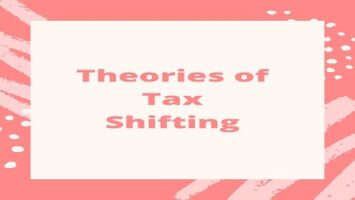Superiority Over Traditional Theory of Incidence:
The term incidence as commonly used refers to the location of the “ultimate” or the “direct” money burden of the “tax as such”. It is said to occur whenever a particular price of the tax comes to ‘rest’ with the final payee, whether at the point of impact or further down the direct line of subsequent transactions in the taxed product or service. Effects are referred to as all “other” income changes that result in the course of the adjustment process. Thus, effects are defined as residual, including both changes in output and those changes in distribution that are not considered a part of the direct money burden.
In this context, Prof. Musgrave pointed out that this terminology cannot easily be interpreted. He pointed out the following difficulties:
(1) The traditional distinction between direct effects and indirect effects involves an arbitrary separation between various elements of the total change that are neither separately identifiable nor of separate significance as matters of policy. Musgrave further said that while examining the distributional consequences of any particular budget change all factors bearing on it must be considered. No special significance should be attached to the changes that come about in the direct path of transactions in the taxed product or service, compared with those which come about in the indirect path of subsequent adjustment. But all changes must be considered as interdependent parts of the adjustment, proceeding in one and the same system of general equilibrium.
Thus, in support of his view, Musgrave said that the distinction between resource transfer, distributional change, and output effects is not open to this objection. The three aspects are distinctly measurable and significant components of the overall change. Whether the element of distributional change should be given the label of incidence is a matter of taste. Some may prefer to call it merely the distributional effect of the budget policy.
(2) The concept of incidence as locating the ultimate burden of a tax starts from the false premise that a tax as such has an ultimate burden. Taxes may be imposed, removed, and substituted for each other, without involving resource transfer to public use. A clear distinction must be drawn between the combined consequences of increased resource transfer to public use as financed by a given tax and the consequences of a change in methods of financing alone with unchanged resource transfer to public use. The distributional results of the former type of change are here referred to as budget incidence and those of the latter as tax incidence. With regard to tax incidence, the problem of differential incidence is of particular interest. It is defined as the distributional change that results as one tax is substituted for another tax of equal yield, the term equal yield is defined differently in the classical and in the contemporary system.
(3) When examining resulting changes in the real income of individuals, all such changes must be allowed for. This included those which result from the income source side; caused by the changes in the net (after tax) prices of the services they have to sell, as well as those which result from the income uses side, caused by the changes in the gross (after tax) prices of the products they have to buy. This was recognized fully in the incidence analysis of Ricardo, whose discussion of a tax on land nicely distinguished between the effects on the landowner as a recipient of rent and as a consumer of corn.
Thus, Musgrave said that “whether we look at incidence from the point of view of public policy or particular individuals, it is a matter of indifference how the final distributional changes are arrived at. They must be allowed for, whether they are due to price changes in taxed or in tax-free items, in products or in factors, whether they are arrived at in a direct or an indirect way, and whether they occur on the sources or the uses side of the household budget.
(4) In determining the distributional changes that result from an adjustment in budget policy, Musgrave believed in tracing both losses and gains that may occur to a particular individual. Here, he pointed out that this runs counter to the notion that the imposition of a tax imposes a loss and that it is the problem of incidence to locate this loss. But according to Musgrave, the latter is clearly not the problem, if we measure the results of a tax change or tax incidence while holding constant the resource transfer of public use. Here no reduction in resources available for private use occurs, and the losses to some will be accompanied by gains to others.
Even in the case of budget incidence where a resource transfer to public use is involved, we cannot limit our analysis to merely tracing the occurrence of losses in income available for private use. The net result of the adjustment will be to reduce the total income available for private use, but this does not mean that all individuals suffer a reduction in such income. Some may find their position improved, even though full employment prevails at the outset; and there may be a gain for the group as a whole if unemployment prevails at the outset.
In any case, we can never point to particular items, of loss and identify these with the burden of the new tax or the cost of the new resource transfer, while reducing other gains or losses to the status of indirect effects. Rather, we must consider the entire change in distribution including all individual gains as well as losses.
On the basis of the above discussion, it is obvious that the analysis of Porf. Musgrave on incidence is of more practical utility than traditional concept.









Comments (No)